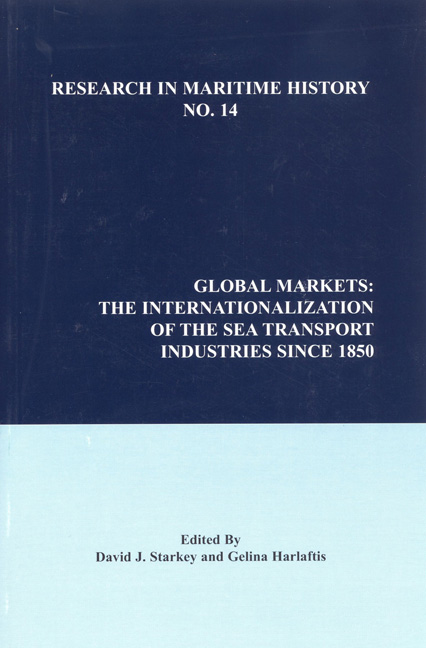Book contents
- Frontmatter
- Contents
- About the Editors
- Contributors
- Introduction
- “International Freight Markets in the 1830s and 1840s: The Experience of a Major Finnish Shipowner”
- “The First (and Very Secret) International Steamship Cartel, 1850-1856”
- “Competition or Co-operation in the Global Shipping Industry: The Origins and Impact of the Conference System for British Shipowners before 1914”
- “National Alliances and Global Webs: The Internationalization of Japanese Shipping”
- “Dutch Sea Transport in Transition: The German Hinterland as Catalyst, 1850-1914”
- “The Expansion of American Interests in Transatlantic Commerce and Trade, 1865-1893”
- “The Expansion of Japan's Shipping Interests before the Sino-Japanese War”
- “Cooperation and Reorganization on the North-South Routes from Japan in the Interwar Period”
- “The Global Communications Industry and Its Impact on International Shipping before 1914”
- “The Nineteenth-Century Roots of Globalization: Some Technological Considerations”
- “The Global Fish Market: Internationalization and Globalization, 1880-1997”
- “Convergence or National Styles? The Japanese Challenge to the British-Norwegian Hegemony in the Twentieth-Century Whaling Industry”
- “International Trends and Greek Shipping: The Business Strategy of Demetrios Moraitis, 1893-1908”
- “Organizational and Managerial Patterns of Greek- Owned Shipping Enterprises and the Internationalization Process from the Internar Period to 1990”
- “Internationalization and the Collapse of British Shipbuilding, 1945-1973”
- “Globalization and International Competitiveness: The Experience of the Japanese Shipping Industry since the 1960s”
- “Containerization and the Globalization of Liner Shipping“
“The Expansion of American Interests in Transatlantic Commerce and Trade, 1865-1893”
- Frontmatter
- Contents
- About the Editors
- Contributors
- Introduction
- “International Freight Markets in the 1830s and 1840s: The Experience of a Major Finnish Shipowner”
- “The First (and Very Secret) International Steamship Cartel, 1850-1856”
- “Competition or Co-operation in the Global Shipping Industry: The Origins and Impact of the Conference System for British Shipowners before 1914”
- “National Alliances and Global Webs: The Internationalization of Japanese Shipping”
- “Dutch Sea Transport in Transition: The German Hinterland as Catalyst, 1850-1914”
- “The Expansion of American Interests in Transatlantic Commerce and Trade, 1865-1893”
- “The Expansion of Japan's Shipping Interests before the Sino-Japanese War”
- “Cooperation and Reorganization on the North-South Routes from Japan in the Interwar Period”
- “The Global Communications Industry and Its Impact on International Shipping before 1914”
- “The Nineteenth-Century Roots of Globalization: Some Technological Considerations”
- “The Global Fish Market: Internationalization and Globalization, 1880-1997”
- “Convergence or National Styles? The Japanese Challenge to the British-Norwegian Hegemony in the Twentieth-Century Whaling Industry”
- “International Trends and Greek Shipping: The Business Strategy of Demetrios Moraitis, 1893-1908”
- “Organizational and Managerial Patterns of Greek- Owned Shipping Enterprises and the Internationalization Process from the Internar Period to 1990”
- “Internationalization and the Collapse of British Shipbuilding, 1945-1973”
- “Globalization and International Competitiveness: The Experience of the Japanese Shipping Industry since the 1960s”
- “Containerization and the Globalization of Liner Shipping“
Summary
There is nothing unusual for an underdeveloped nation, which has experienced an industrial revolution, to seek control of the international distribution system bringing passengers and freight to its shores. This was true of the United States in the last third of the nineteenth century. The period 1865-1893 saw the rebirth of the American merchant marine following the Civil War (1861-1865). An integral part of this stage of American economic development involved transatlantic expansion as American economic ties began to stretch around the globe. Furthermore, rapid industrialization in America after 1865 made possible the construction in American shipyards of iron-hulled, ocean-going steamships. Simultaneously, the expansion of the American railroad industry provided the financial resources for investment in steamship enterprises. The Pennsylvania Railroad Company (PRR) was the largest economic enterprise in the United States and sought to expand its international trade in every way, but particularly through the port of Philadelphia.
One of the greatest rivals of the PRR was the New York Central Railroad which was admirably positioned to greet the constant stream of immigrants crossing the Atlantic to New York City and assist those passengers on their way to the hinterland of the United States. This was a challenge which simply could not go unanswered after the conclusion of the Civil War. In the Eastern United States continental rivalry fostered transatlantic competition in an effort to develop global control of the transportation of passengers and freight from European points of origin, across the North Atlantic, and to destinations throughout North America. The challenges to the Pennsylvania Railroad in attempting to achieve these goals were manifold.
The American Civil War wreaked havoc with the American merchant marine. The overall effect of the disastrous four-year struggle was the annihilation or alienation of a large percentage of the prewar American-flag fleet. Ships that remained under the American flag lost market share as cargoes went to safer flags, were laid up to rot away, or captured by Confederate raiders. The solution for a large number of owners was to leave the American flag for other flags of convenience only to find that the American Congress in a fury at such disloyalty forbade them ever to return to American registry.
- Type
- Chapter
- Information
- Global MarketsThe Internationalization of The Sea Transport Industries Since 1850, pp. 127 - 148Publisher: Liverpool University PressPrint publication year: 1998



